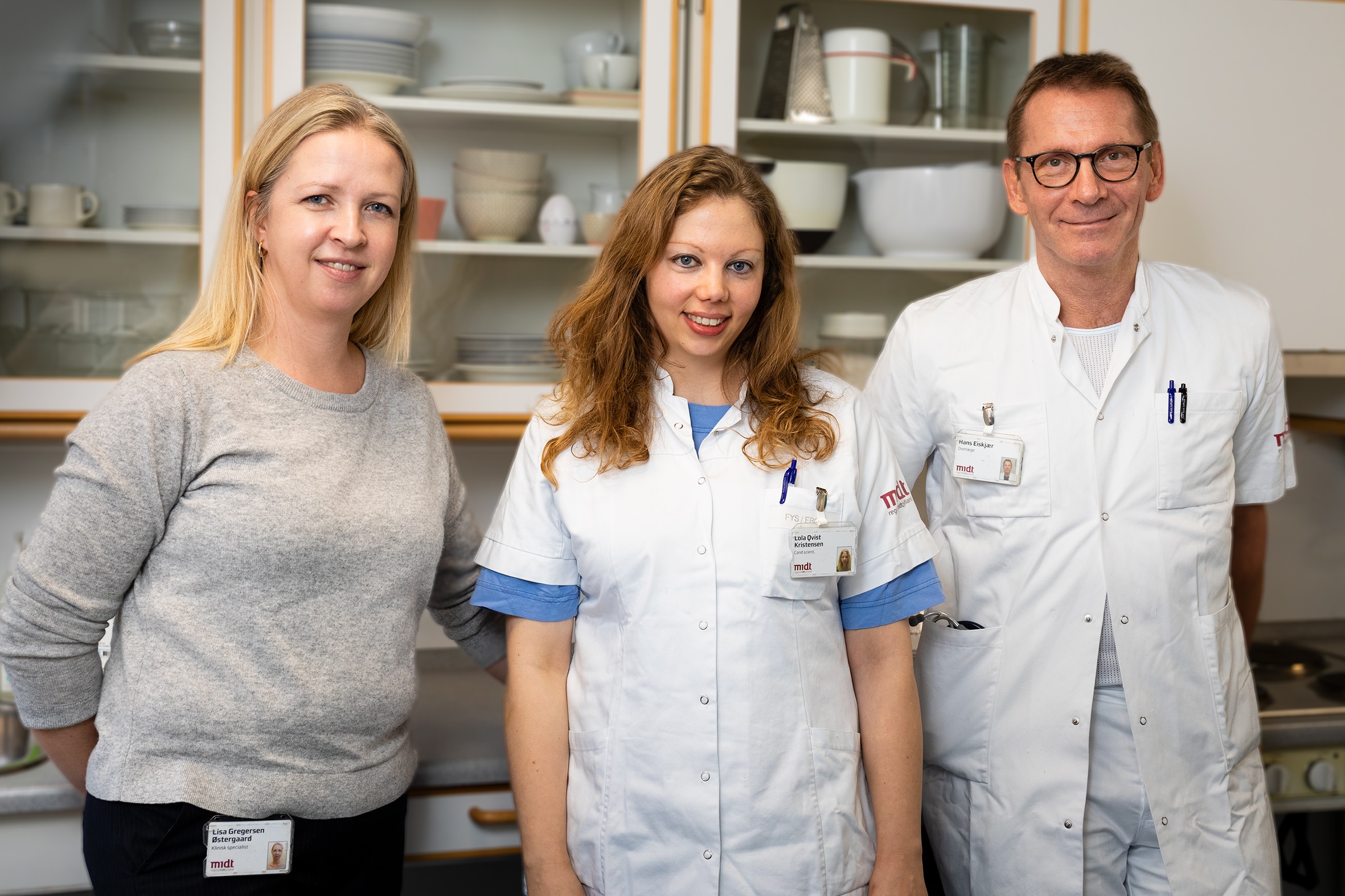01.03.22
Lisa Gregersen Østergaard, Senior Researcher, Lola Qvist Kristensen, Occupational Therapist and PhD student and Hans Eiskjær, Consultant and Professor in the test kitchen where some of the assessments of the survivors of cardiac arrest take place. Photo: Tonny Foghmar
New research project will identify survivors of cardiac arrest outside hospital at increased risk of experiencing problems in everyday life.
In Denmark, we have become better at managing cardiac arrest outside hospital and treatment options have also improved. More people survive cardiac arrest but many also face major changes in everyday situations and experience a decreased quality of life. Demands increase to the healthcare system and to research focusing on the future life of survivors of
cardiac arrest.
About 50% of those surviving cardiac arrest outside hospital experience cognitive difficulties related to e.g., memory and concentration. Reduced cognitive functions impact on the performance of daily tasks, participation in society and maintenance of a good quality of life. A high number of people surviving cardiac arrest outside hospital may find it difficult to manage complex activities such as shopping, driving, resuming family roles and returning to work.
Already in 2017, occupational therapists, nurses and cardiologists at Aarhus University Hospital brought the challenges of returning to everyday life among cardiac arrest survivors into focus – challenges only discovered long after their discharge from hospital.
- We would like to know more about those at particular risk of experiencing problems in their everyday life after discharge to identify their needs for rehabilitation and ensure they are referred to rehabilitation, says Lola Qvist Kristensen, occupational therapist at Aarhus University Hospital and PhD student at Aarhus University.
Aarhus University Hospital initiated a PhD project to explore how survivors of cardiac arrest outside the hospital managed their everyday life after being discharged from hospital. A part of the project investigates if it is possible already during the admission to identify those who will experience challenges in everyday life, not return to work and have a poor quality of life.
Moreover, the project will assess the costs of the problems experienced by survivors for the healthcare system, the labour market and social services. This will contribute with knowledge to be used in future rehabilitation efforts.
The patients are followed (in a prospective follow-up study design) and their ability to perform daily activities is assessed by interviews and observations.
Their cognitive function and quality of life is assessed by tests. The patients are assessed during the first admission to hospital and six months after the cardiac arrest.
A cost-of-illness study is also made using data from national registries to estimate the national costs related to this patient group.
- We expect the results will contribute to optimise referral of the patients after hospital admission, and to develop relevant interventions, says Hans Eiskjær, Consultant at Aarhus University Hospital and Professor at Aarhus University.
- If we already during the admission can identify the persons at risk of developing problems in their everyday life and losing their connection to the labour market, we can target rehabilitation interventions for survivors of cardiac arrest in the future.
Currently, more than 140 patients are part of the project and follow-up tests have been completed in more than 90 patients. It is expected to enroll 200 survivors of cardiac arrest outside hospital during 2022.
Facts
- The PhD project is conducted at Department of Public Health, Aarhus University. The project is performed at Department of Physiotherapy and Occupational Therapy, Aarhus University Hospital in collaboration with Department of Cardiology, Aarhus University Hospital and DEFACTUM, Central Denmark Region
- Lola Qvist Kristensen is an Occupational Therapist and PhD student at the project. Lisa Gregersen Østergaard (Senior Researcher, DEFACTUM and Associate professor, Department of Public Health) is the main supervisor. Hans Eiskjær (Professor, DMSc, Department of Cardiology, Aarhus University Hospital) and Maurits van Tulder (Professor, Department of Physiotherapy and Occupational Therapy, Aarhus University Hospital and Dean, Health Sciences Faculty of Science Amsterdam and Movement Sciences research institute Vrije Universiteit Amsterdam) are co-supervisors
- The project is supported by Central Denmark Region (Folkesundhed i Midten) with DKK 100,000, a local research fund at Aarhus University Hospital with DKK 45,000, the research fund of the Danish Association of Occupational Therapists with DKK 237,000, the Danish Health Confederation with DKK 1 Mio., and Department of Public Health, Aarhus University with DKK 450,000.
Further information:
Lola Qvist Kristensen,
Occupational Therapist, MSc in Health Science Aarhus University Hospital
PhD student at Aarhus University
Tel.: +45 7845 6730, e-mail lola.qvist@rm.dk
Hans Eiskjær,
Consultant, DMSc Aarhus University Hospital
Professor at Aarhus University
Tel.: +45 3092 2347, e-mail: hanseisk@rm.dk
